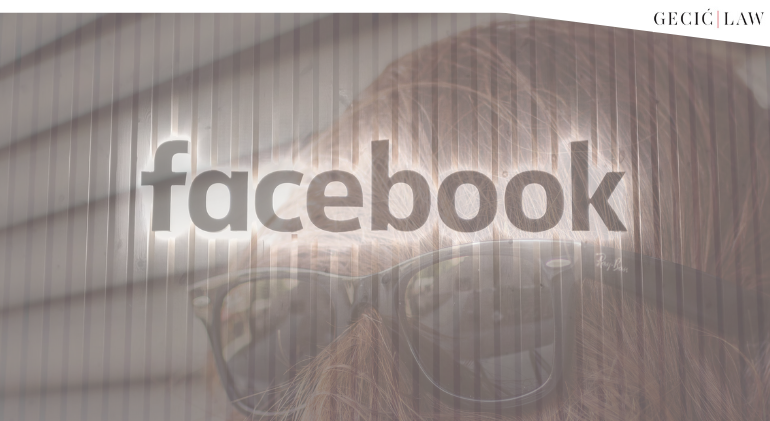

Facebook teamed up with Ray-Ban to create Ray-Ban Stories, new smart glasses. The product, which will initially be only available in stores in Australia, Canada, Ireland, Italy, the UK and the US, is already facing severe scrutiny over privacy concerns. So, how are different privacy watchdogs taking the development of these spectacles? Did Facebook take any steps to respond to privacy concerns? And finally, could the smart glasses come under the radar of privacy watchdogs in the Western Balkans?
Smart glasses are not a new technological development. The concept has been around for the past seven years. Similarly, to their predecessors created by Snap and Google, the Ray-Ban Stories smart glasses offer users to take photos and videos with a camera integrated into the glasses. The device can also be used as a phone. Additionally, it can play music and share content directly on social media.
Google and Snap had both entered the fashion-tech market and the results were somewhat mixed. Unlike the Ray-Ban Stories, the Google Glass presented the wearer with on-screen and user-friendly information instantaneously. Meanwhile, Snap focused on augmented reality when developing its ‘Spectacles’.
Besides some of the technical aspects with both Spectacles and Glass one major setback was that of privacy. In fact, some restaurants and bars even banned wearers from entry.
Usually, when a big tech company releases a new product, privacy questions are raised. Sometimes, they concern mostly the customer that purchased the product like in the case of Apple’s access to health data through the Apple Watch. However, smart glasses are unique because they record not only the person who decided to buy them but also many others who did not give any consent. The glasses do include a white light that turns on while someone is taking photos or a video. Still, for many, this indication is not as apparent and might not be enough.
Despite reassuring the public in a series of documents that the Facebook and Ray-Ban smart glasses respect privacy, Facebook is facing questions on data privacy through the Irish Data Protection Commission from the Italian data protection and privacy watchdog, Garante. Facebook’s troubled relationship with data privacy is widely known and it comes as no surprise that the announcement of a product that can be easily misused (e.g., filming without consent, recording private meetings, etc.) raises concerns among both regulators and consumers. Recognizing these concerns, Facebook decided to really delve into the nitty-gritty of potential privacy infringements by dedicating half of its press release to this subject and creating a website designed solely for addressing the privacy questions.
To protect the principle of legal certainty and ensure a consistent practice when dealing with privacy matters, the GDPR, Europe’s Magna Carta on data protection, sets up a one-stop-shop mechanism. In a nutshell, this mechanism prescribes that if an entity (in this case Facebook) conducts cross-border data processing, then said entity will have to work primarily with the supervisory authority of the same Member State where their main establishment is (usually their EU headquarters) to achieve compliance. Hence, we arrive at the shores of Ireland where Facebook’s EU headquarters are and the reason why Garante asked its Irish counterpart several questions on privacy implications of the new glasses. Most notably, it asked how the data collected through the glasses will be processed and on what legal basis, how will Facebook deal with the question of consent to be filmed and how will the collected data be handled are the burning topics for every regulator. The Irish Data Protection Commission will, pursuant to the one-stop-shop mechanism, bear the brunt of the concerns regarding privacy and Facebook’s Ray-Ban smart glasses.
The speed and expansion of digital development and breakthroughs seem like a never-ending tide of legislative challenges where regulators are almost always playing catchup with the Big Tech companies. With the rapid spread of technology, such as these new glasses, it seems like the question is if, not when will products like these reach the Western Balkans. When that day comes, the Serbian watchdog, the Commissioner for Information of Public Importance and Personal Data Protection, will have to both assess and ensure compliance with the Personal Data Protection Act. Issues raised by Italy are questions that every regulatory agency will have to ask.
Furthermore, this question might even have a criminal tone to it if we look at the Serbian Criminal Code. Under Article 145, any unauthorized publication and presentation of another’s texts, portraits and recordings constitutes a criminal act. Situations, where someone is accidentally caught on camera, are not science fiction. These scenarios are more than plausible, whether someone notices the light on the glasses or not.
It appears that the Big Tech cannot get a break when dealing with data privacy compliance. Constant technological developments and new products are pushing the limit of what we once thought was possible, but in doing so, Big Tech always needs to consider whether what they are doing is legal. The persistent “battle” between legislation and innovation makes way to both new concerns and creative solutions concocted by Big Tech to ensure compliance. One thing is certain, these glasses sent shockwaves all around the globe. The entire media focus on Facebook’s Ray-Ban glasses could possibly even be a genius/devious plan from the Facebook marketing team. However, the questions Italy’s watchdog is asking are very real.